How humanists changed Scottish marriage
- Published
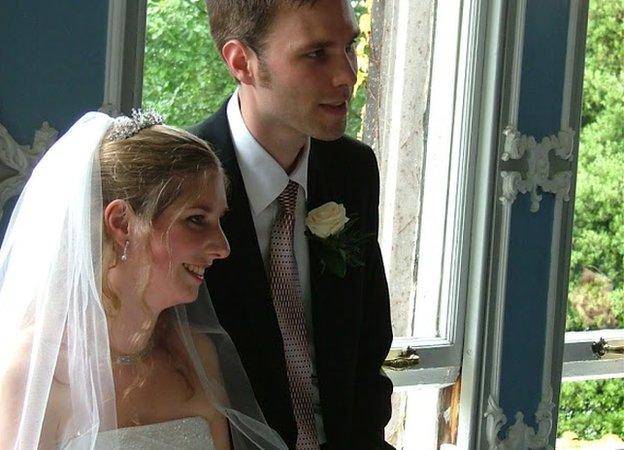
Karen Watts & Martin Reijns were the first Scottish couple to have a humanist wedding
The first humanist wedding in Scotland took place exactly 10 years ago. Over the past decade the number of ceremonies conducted by humanist celebrants has grown massively, already overtaking Catholic weddings and threatening to replace Church of Scotland as the most popular belief service.
On 18 June 2005 Karen Watts and Martin Reijns were married by a humanist celebrant at Edinburgh Zoo, external.
They were the first of 82 couples to be married in such ceremonies that year, after previous rules were changed because they were deemed to be restrictive and discriminatory.
Rules on the venues in which Scottish couples could marry had been relaxed in previous years but services still had to be carried out by a minister of religion or an official civil registrar.
The changes meant 12 non-religious humanist celebrants were given the same "belief" status under the marriage law as Kirk ministers or priests.
After just five years, the number of humanist weddings (2,092) exceeded the number of Roman Catholic ceremonies in Scotland.
By 2013, the last year for which the National Records of Scotland has issued full statistics, Church of Scotland weddings had declined to 4,616 - down from 10,016 a decade earlier.
The Humanist Society Scotland (HSS) predicts its celebrants will this year preside over more than 4,200 marriages and overtake the number performed by Kirk ministers.
Why is a movement that was barely known a decade ago now hoping to conduct more weddings than the Church of Scotland?
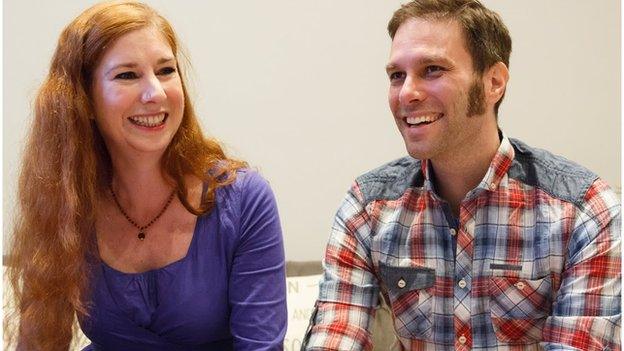
Karen Watts & Martin Reijns have now been married 10 years
Scotland is the only place in the UK where humanist weddings are legal.
In England and Wales, non-religious weddings must be conducted by a registrar, either at a registry office or at an approved building such as a hotel or stately home.
The British Humanist Association has been campaigning for something similar to the Scottish rules to be introduced south of the border and it was to have been introduced as part of the new laws that ushered in same-sex marriage.
However, despite a UK government review finding 95% of people in favour of the move, it was dropped by the Tory-Lib Dem coalition just before Christmas.

What is humanism?
Humanism is a democratic and ethical life stance, which affirms that human beings have the right and responsibility to give meaning and shape to their own lives.
It stands for the building of a more humane society through an ethic based on human and other natural values in the spirit of reason and free inquiry through human capabilities.
It is not theistic, and it does not accept supernatural views of reality.
International Humanist and Ethical Union

The Humanist Society Scotland said if it had been left to politicians the change in Scotland may never have occurred either.
The HSS campaigned for years for an amendment to the Marriage (Scotland) Act 1977 to allow legal humanist wedding ceremonies but in the end it was a decision by the Registrar General for Scotland that allowed the change.
He made the decision after considering Article 9 of the European Convention on Human Rights on "freedom of thought, conscience and religion", which includes non-religious belief.
Originally 12 celebrants from the Humanist Society were granted the power to conduct wedding ceremonies on the same basis as other "belief" systems.
The HSS now has about 115 celebrants and hopes to recruit more later this year.
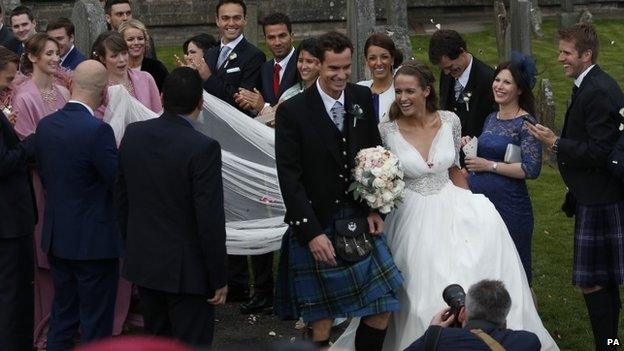
Andy Murray and Kim Sears chose a Church of Scotland wedding at Dunblane Cathedral
Gordon MacRae, chief executive of the Humanist Society Scotland, said its ceremonies allowed people to celebrate with their friends and family in any way they chose.
He said a couple could express their love and commitment by telling their story in front of their loved ones, in their own words rather than those of a Church or state.
"It is a celebration that can really reflect the personalities of the couples and can include their friends and families and is free from any dogma," he said.
"It is amazing that this is not available elsewhere in the UK."
Mr MacRae said: "Humanism is a belief. We are a world view with 4,000 years of history and 10,000 members here in Scotland.
"We are a growing organisation with people all the way from Shetland to Stranraer, there are people who are putting a rational, ethical and democratic approach to life at the front and centre of how they want to contribute and live in this country."
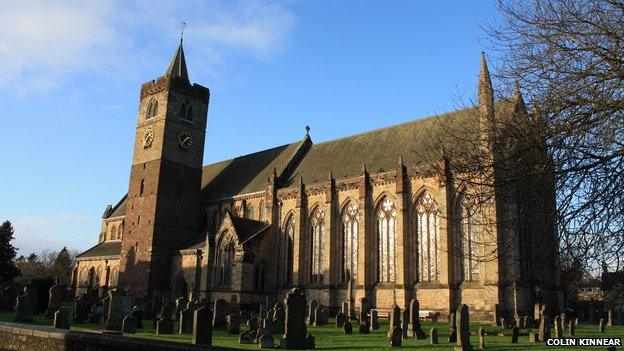
The traditional church wedding has been declining in popularity
He said a big growth in demand had come from people who attended someone else's humanist wedding and saw for the first time that you could have a "truly personalised ceremony".
"Our celebrants incorporate pretty much anything that the couple want to put in the ceremony," he said.
"Whether it is on the top of a mountain or just in a living room we will make sure that experience is about them. When people open their eyes to that they see that they don't just have to accept what people in positions of authority tell them to do.
"It is incredible that it has taken so long to allow people who share this world view to get married in a way that reflects their true beliefs."
The Church of Scotland said people who were taking the important decision to get married for all the right reasons were to be welcomed, whether they held religious beliefs or not.
However, Acting Principal Clerk George Whyte said the Kirk was not run as a business, had never advertised its services and would marry people without charging.
The Reverend Dr Whyte said: "We've been a bit reticent about saying that most of our ministers are flexible about how and where we do weddings. We will do that without charging a fee and without insisting they join our church.
"We will carry out weddings of all sizes and locations, taking on people's tastes and preferences with a level of flexibility that is not widely known."
He said local ministers would always be happy to discuss with people the type of wedding they wanted.
Dr Whyte said the service would be a Christian one in which people made their promises in the eyes of God but they would not need to be church-goers before or after the ceremony and would not join the church by getting married in one of its buildings.
The Kirk minister said a humanist celebrant would charge a significant fee for carrying out a wedding service. It currently costs about £390 for a HSS-registered celebrant plus the cost of becoming a member of the society.
Dr Whyte said: "We are not selling ourselves as an exercise in earning money from people's weddings."
"They offer a service people can buy and perhaps feel in the buying of a service they can tailor it in ways they want.
"Perhaps that is more in tune with our consumerist society."
The HSS said it was transparent about its fees, which covered the time to arrange the ceremony as well as its delivery on the day.
Mr MacRae concluded that, with the Church of Scotland and the Catholic Church opting out of conducting same-sex marriages, which became legal at the turn of the year, the demand for humanist ceremonies was likely to grow even further.
- Published18 June 2015
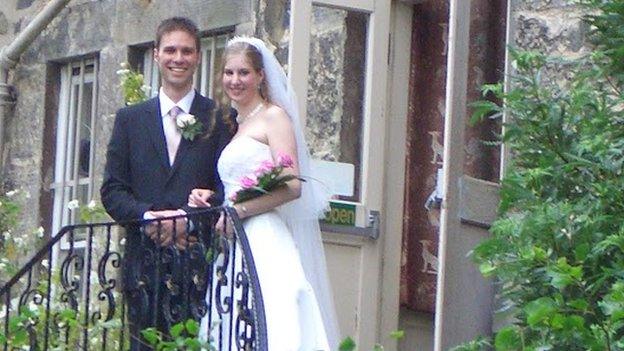
- Published19 April 2013
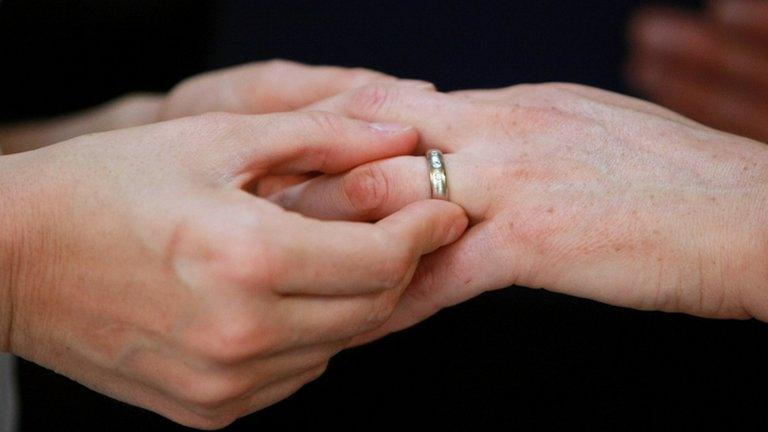
- Published20 February 2011